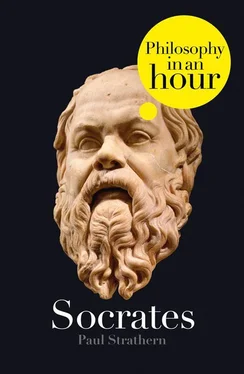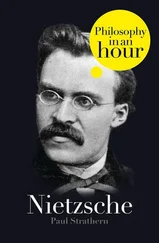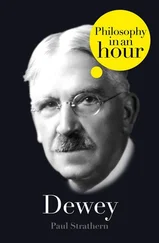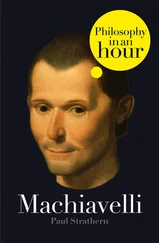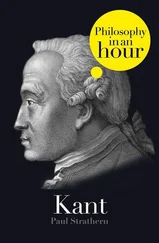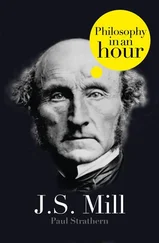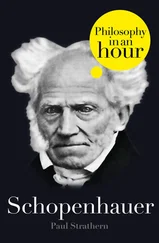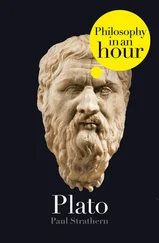Anaxagoras was the first Athenian philosopher – though it’s almost certain he was originally an import, shipped in from Ionia (Asia Minor) by Pericles to raise the tone of Athenian education. Anaxagoras was very much a minor philosopher. He reversed the trend of explaining the world in terms of a single substance, claiming rather that it consisted of an infinite number of substances. Indeed, everything contained a bit of everything else. As a result of this mélange he was forced to argue that even plants had a mind of their own, that snow was partly black, and that water contained elements of dryness. Despite these anomalies masquerading as ideas, Anaxagoras is important. It was he who introduced philosophy to Athens, and he was also the man who introduced philosophy to Socrates. Anaxagoras was Socrates’ teacher.
According to one source, Anaxagoras also taught Pericles, who went on to become the driving political force behind Athens’s golden era (mid-440s B.C. to the end of the 430s B.C.). This period saw the construction of the Parthenon, the great era of Greek tragedy, the sculpture of Phidias (whose Zeus became one of the Seven Wonders of the Ancient World), and the emergence of classical philosophy with Socrates. What part (if any) Anaxagoras had in influencing Pericles is not known. What is known is that Anaxagoras claimed the sun was a huge super-hot rock and the moon was made of earth. For expressing such ideas (ironically his only ones that came close to the truth) Anaxagoras was prosecuted for impiety and forced to flee Athens for his life. This is the first real evidence of philosophy being taken seriously. It was dangerous.
Anaxagoras first demonstrated these lessons to Socrates – that philosophy was both serious and dangerous. As we shall see, Socrates chose to ignore them. Ignoring the first lesson made him one of the most engaging of all philosophers. Ignoring the second was to cost him his life.
Just a century after it had begun, philosophy entered its greatest age. This was to include three of the finest philosophers the world has seen. The first of these was the idiosyncratic Socrates, who spent so much of his time talking about philosophy on the streets of Athens that he never actually got around to writing anything down. This means that we know of Socrates’ teaching only through the writings of his famous pupil Plato, and it’s often difficult in these writings to determine which ideas are Plato’s and which are those of his mentor.
Socrates developed a method of negatively aggressive questioning called dialectic (the forerunner of logic). This he used in conversation to cut through the twaddle of his adversaries and arrive at the truth. Plato captured the spirit of these conversations in his classic dialogues. Plato’s more orthodox approach and way of life were to bring a much-needed element of respectability to philosophy. But he persisted in the philosophic tradition of getting it wrong. Plato believed that the real world was made up of ideas, and that the world we see and experience consists of no more than shadows. Despite this unrealistic attitude, many thinkers believe that all of philosophy since has been little more than footnotes to Plato’s writing. Although this is an exaggeration, it’s certainly true that Plato was the first to formulate clearly many of the basic philisophical problems that exercise us to this day.
The third member of this triumvirate was Aristotle, who was one of Plato’s pupils. The scholarly Aristotle firmly rejected his master’s attempt to make philosophy interesting by presenting it in the form of dialogues. Instead he wrote scores of treatises, many of which were mislaid by his ungrateful followers. Aristotle’s rules of thought and classification laid the foundations for most philosophical and scientific thought during the next two millennia. Only in recent centuries have we begun to appreciate how Aristotle got it wrong. He appears to have understood that all comprehensive explanations were bound in the end to be wrong – but this didn’t stop him from trying for one.
Without philosophy, which began in ancient Greece and for centuries retained its distinctive Greek character, we would not be what we are today. We would have no science, and the attempt to arrive at truth of any sort would remain largely a matter of fantasy and whim – just as it remains in the so-called sciences of politics, psychology, and economics, for instance. Even ethics continues to languish in this sad state, despite the persistent attentions of philosophers and theologians through the ages. Nowadays we are not only no better, morally speaking, than we were more than two thousand years ago, but we don’t even know how to be.
It has taken philosophers twenty-five centuries of getting it wrong to conclude that getting it wrong isn’t the point. Now they believe that the mere practice of philosophy is what matters. Thus philosophy has become an activity, like wine-tasting or tax evasion, with similarly ambiguous effects on the practitioner. For the first time in the history of philosophy, the attempt by any individual to construct a philosophy as such (that is, one of his own) has become redundant. The tradition of Plato, Kant, Ehrensvard, and Wittgenstein has come to an end. This tradition of reason and observation, which attracted some of the finest minds the world has known, first grew to maturity with Socrates.
Socrates was born in 469 B.C. in a village on the slopes of Mount Lycabettus, which was then a twenty-minute walk from Athens. His father was a sculptor and his mother a midwife. Initially the young Socrates was apprenticed to his father; according to one tradition, he worked on The Three Muses in Their Habits which adorned the Acropolis. He was then sent to study with Anaxagoras.
Socrates went on to study under the philosopher Archelaus, “by whom he was beloved in the worst sense,” according to Diogenes Laertius, the third-century A.D. biographer. In ancient Greece, as still in much of the eastern Mediterranean, homosexuality was regarded as a quite acceptable diversion. Not until the advent of Christianity was a limited heterodox approach to replace such orthodox sexual practice. So while Anaxagoras was forced to flee Athens in fear of his life for teaching his pupils that the sun was a radiant star, Archelaus remained free to indulge in more than intellectual intercourse with his pupils.
With Archelaus, Socrates studied mathematics and astronomy as well as the teachings of earlier philosophers. Philosophy had been pursued for just over a century and was very much the nuclear physics of the age. Indeed, the world of philosophy (which consisted entirely of water, then fire, then points of light, and so on) bore as much relation to the real world as the world of modern nuclear physics bears to our own everyday reality. We scarcely regard our encounters with mesons as the highlight of our daily existence, and one suspects that the ancient Greeks had a similarly blasé attitude toward the latest revelation that their world was in fact a goldfish bowl, a furnace, or a fireworks display.
Socrates soon decided that these speculations about the nature of the world were of no possible benefit to humanity. For an ostensibly reasonable thinker, Socrates was curiously antiscientific. Here he was almost certainly influenced by one of the greatest pre-Socratic philosophers, Parmenides of Elea. During his youth Socrates is said to have met the aging Parmenides and “learned much from him.” Parmenides resolved the conflict between those who believed the world was made up of a single substance (such as water or fire) and those like Anaxagoras who believed it consisted of a great many substances. He overcame this conflict by the simple method of ignoring it. According to Parmenides, the world as we know it is merely an illusion. It doesn’t matter how many things we think it is made of, because it doesn’t exist. The only true reality consists of eternal Being, which is infinite, unchanging, and indivisible. For this Being there is no past and no future: it subsumes the entire universe and everything that can possibly happen in it. “All is one” was Parmenides’ basic principle. The ever-changing multiplicity we observe is merely the appearance of this static, all-embracing Being. Such an attitude to the world is scarcely favourable to science. Why bother with the workings of the world when they are nothing but an illusion?
Читать дальше
